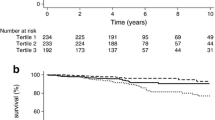Abstract
Although zinc deficiency increases the risk of oxidative DNA damage, data regarding the association between zinc and oxidative DNA damage in diabetes are controversial. In this article, we focus on serum zinc levels and its relation to an established biomarker of oxidative DNA damage (8-hydroxy-2-deoxyguanosine) in patients with type 2 diabetes, and to ascertain the beneficial effects of zinc supplementation on the level of oxidative DNA damage. The study consisted of 2 interrelated parts: The first part was a cross-sectional study conducted on patients with type 2 diabetes (n = 297) and healthy individuals (n = 188). The second part was an interventional study that enrolled 38 diabetic patients with low zinc status and high DNA damage. The demographic parameters including age, gender, and body mass index were recorded, and DNA damage marker through 8-hydroxy-2-deoxyguanosine levels, and zinc status of serum zinc, was measured. Significantly higher 8-hydroxy-2-deoxyguanosine levels (P < 0.00) together with lower zinc levels (P < 0.001) were found in the diabetics compared to healthy controls. Patients with low zinc status had higher levels of 8-hydroxy-2-deoxyguanosine compared to patients with normal zinc status. In diabetic patients, a negative correlation of 8-hydroxy-2-deoxyguanosine was observed with zinc (P = 0.070). Zinc supplementation showed a significant decrease in 8-hydroxy-2-deoxyguanosine by (26.0%) and increased in serum zinc by (42.0%). Elevated 8-hydroxy-2-deoxyguanosine levels in conjunction with low zinc status may indicate a high degree of oxidative DNA damage in diabetic patients. The results confirm that zinc supplementation in this group may help correct abnormal levels of 8-hydroxy-2-deoxyguanosine.
Similar content being viewed by others
References
Leone N, Courbon D, Ducimetiere P, Zureik M (2006) Zinc, copper, and magnesium and risks for all-cause, cancer, and cardiovascular mortality. Epidemiology 17(3):308–314
Simone S, Gorin Y, Velagapudi C, Abboud HE, Habib SL (2008) Mechanism of oxidative DNA damage in diabetes. Tuberin inactivation and downregulation of DNA repair enzyme 8-Oxo-7,8-dihydro-2′-Deoxyguanosine-DNA Glycosylase. Diabetes 57(10):2626–2636. https://doi.org/10.2337/db07-1579
Lima VB, SampaioFde A, Bezerra DL, MoitaNeto JM, Marreiro DN (2011) Parameters of glycemic control and their relationship with zinc concentrations in blood and with superoxide dismutase enzyme activity in type 2 diabetes patients. Arq Bras EndocrinolMetabol 55(9):701–707
Dandone P, Thusu K, Cook S, Snyder B, Makowski J, Armstrong D et al (1996) Oxidative damage to DNA in diabetes mellitus. Lancet 347:444–445
Fenech M, Ferguson L (2001) Vitamins/minerals and genomic stability in humans. Mutat Res 475:1–6
Song Y, Leonard SW, Traber MG, Ho E (2009) Zinc deficiency affects DNA damage, oxidative stress, antioxidant defenses, and DNA repair in rats. J Nutr 139(9):1626–1631
Mahmoud HM, Al-Tmimi DJ (2012) Current zinc status among the healthy population in Duhok city, Iraq. Duhok Med J 6:15–20
Ruz M, Carrasco F (2013) Zinc as a potential coadjuvant in therapy for type 2 diabetes. Food Nutr Bull 34:215–221. https://doi.org/10.1177/156482651303400210
Mustafa TG, Monirujjaman MD, Zabeen S, Hossain B (2010) Effect of zinc supplementation on serum zinc level and micronucleus frequency in Bangladeshi adult females with poor socioeconomic status. AKMMC J 1:4–8
Mahmoud HM, Al-Tmimi DJ (2019) Evaluation of DNA damage in type 1 diabetes patients. J Clin Diagn Res 13(5):BC04–BC06
Al-Timimi DJ, Al-SharbattiSS A-NF (2005) Zinc deficiency among a healthy population in Baghdad, Iraq. Saudi Med J 26(11):1777–1781
Ali AF, Altimimi DJ (2019) DNA damage and vitamin D status among type 2 diabetic patients. J Clin Diagn Res 13(5):21–24
Al-Timimi DJ, Al-Rubaii AY (2001) Current status of zinc in healthy and sick elderly. J Fac Med Baghdad 43(1):73–76
Al-Timimi DJ, Sulieman DM, Hussen KR (2014) Zinc status in type 2 diabetic patients: Relation to the progression of diabetic nephropathy. J Clin Diagn Res 8(11):CC04–CC08. https://doi.org/10.7860/JCDR/2014/10090.5082
Ho E (2004) Zinc deficiency, DNA damage and cancer risk. J NutrBioch 15:572–578
Marreiro DN, Cruz KJ, Morais JB, Beserra JB, Severo JS, de Oliveira AS (2017) Zinc and oxidative stress: current mechanisms. Antioxidants (Basel) 6(2):24. https://doi.org/10.3390/antiox6020024
Acknowledgments
We acknowledge the support of the staff of Duhok Diabetes Center, who provided the facilities for the interviews and the laboratory work.
Author information
Authors and Affiliations
Corresponding author
Ethics declarations
Competing Interests
The authors declare that they have no competing interest.
Additional information
Publisher’s Note
Springer Nature remains neutral with regard to jurisdictional claims in published maps and institutional affiliations.
Rights and permissions
About this article
Cite this article
Mahmoud, H.M., Ali, A.F. & Al-Timimi, D.J. Relationship Between Zinc Status and DNA Oxidative Damage in Patients with Type 2 Diabetes Mellitus. Biol Trace Elem Res 199, 1276–1279 (2021). https://doi.org/10.1007/s12011-020-02267-9
Received:
Accepted:
Published:
Issue Date:
DOI: https://doi.org/10.1007/s12011-020-02267-9




